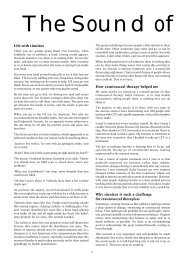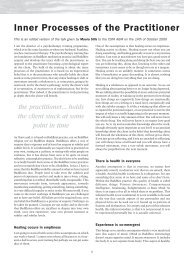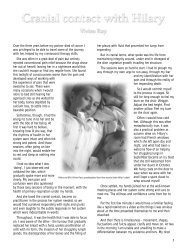Can craniosacral treatment improve the general well- being of ...
Can craniosacral treatment improve the general well- being of ...
Can craniosacral treatment improve the general well- being of ...
You also want an ePaper? Increase the reach of your titles
YUMPU automatically turns print PDFs into web optimized ePapers that Google loves.
What can we conclude<br />
This study has not shown that CST produced a<br />
statistically significant <strong>improve</strong>ment in <strong>general</strong> <strong>well</strong>-<strong>being</strong>.<br />
However, if incidents are taken into account, such as<br />
patients getting flu or a cold in between <strong>the</strong> third and<br />
fourth sessions <strong>of</strong> <strong>the</strong> trial, results show a dramatic<br />
<strong>improve</strong>ment in <strong>the</strong>se patients by <strong>the</strong> final week <strong>of</strong> <strong>the</strong><br />
study (up to 30 points in <strong>the</strong> GWS score). These results<br />
show how <strong>the</strong> patients may have benefited from receiving<br />
CST <strong>treatment</strong>, regardless <strong>of</strong> whe<strong>the</strong>r <strong>the</strong>y became ill for<br />
no apparent reason or due to a healing crisis triggered by<br />
<strong>the</strong> previous CST <strong>treatment</strong>. In addition, if <strong>the</strong> results <strong>of</strong><br />
patients who showed an <strong>improve</strong>ment following <strong>the</strong> CST<br />
<strong>treatment</strong>s and who did not experience any illness or<br />
physical condition were added to <strong>the</strong> previous three<br />
patients, this makes six out <strong>of</strong> ten <strong>of</strong> <strong>the</strong> patients who had<br />
a remarkable increase in <strong>the</strong>ir <strong>general</strong> <strong>well</strong>-<strong>being</strong>. These<br />
results indicate <strong>the</strong> value <strong>of</strong> CST <strong>treatment</strong> in improving<br />
patients’ <strong>general</strong> <strong>well</strong>-<strong>being</strong>. Although statistical analysis<br />
indicates that overall <strong>the</strong> outcome was inconclusive, this<br />
may be due to <strong>the</strong> inability to control variables in this<br />
research which ended up making <strong>the</strong> effects <strong>of</strong> CST<br />
statistically unmeasurable.<br />
Fur<strong>the</strong>r research is needed which takes into<br />
consideration <strong>the</strong> limitations and many variables<br />
mentioned in this research, such as stronger criteria for<br />
<strong>the</strong> inclusion <strong>of</strong> <strong>the</strong> subjects where thorough analysis <strong>of</strong><br />
<strong>the</strong>ir presenting symptoms is carried out; bigger sample<br />
size; additional control and test <strong>treatment</strong>s; more control<br />
over <strong>the</strong> way <strong>the</strong> simulated and CST <strong>the</strong>rapists carry out<br />
<strong>the</strong>ir <strong>treatment</strong>s. It is evident from <strong>the</strong> insight gained from<br />
carrying out this single-blind, randomised, controlled trial,<br />
that <strong>the</strong>re are considerable opportunities to fur<strong>the</strong>r<br />
develop this methodology to assess <strong>the</strong> efficacy <strong>of</strong> CST.<br />
Acknowledgements<br />
All <strong>treatment</strong> sessions took place at The Fountain Clinic, London, with<br />
permission and guidance from Ged Sumner its director.<br />
The University <strong>of</strong> Westminster Ethics Committee gave approval for <strong>the</strong><br />
research protocol.<br />
References<br />
Crawford C.C., A.G. Sparber & W.B. Jonas ‘A Systematic Review <strong>of</strong> <strong>the</strong><br />
Quality <strong>of</strong> Research on Hands-on and Distance Healing: Clinical and<br />
Laboratories Studies’, Alternative Therapies in Health & Medicine 9(3):<br />
96s-104s 2003<br />
Ernst E. ‘Placebo Force’ [abstract]. Wiener Medizinische Wochenschrift<br />
142: 217-219 1992<br />
Ernst E. ‘Towards a Scientific Understanding <strong>of</strong> Placebo Effects’ in<br />
Peters D. (ed) Understanding <strong>the</strong> Placebo Effect in Complementary<br />
Medicine, Churchill Livingstone 2001<br />
Horrigan B. & J. Quinn ‘Therapeutic Touch and a Healing Way’,<br />
Alternative Therapies in Health & Medicine 2 (4): 69-76 1996<br />
Hubble M.A., B.L. Duncan & S.D. Miller The Heart and Soul <strong>of</strong> Change:<br />
what works in <strong>the</strong>rapy, American Psychological Association 2004<br />
Kern M. Wisdom in <strong>the</strong> Body, Thorsons 2001<br />
Kienle G.S. & H. Kiene ‘A Critical Reanalysis <strong>of</strong> <strong>the</strong> Concept,<br />
Magnitude & Existence <strong>of</strong> Placebo Effects’ in Peters D. (ed)<br />
CLINICAL SKILLS COURSE<br />
STARTING IN 2007<br />
A practical four-weekend course for<br />
<strong>craniosacral</strong> <strong>the</strong>rapists covering diagnostic<br />
skills to help identify many common<br />
conditions seen in practice.<br />
Areas covered will include:<br />
* Hypertension and hypotension - use <strong>of</strong><br />
sphygmomanometer * Use <strong>of</strong><br />
stethoscope for evaluating heart<br />
and lung sounds * Percussion diagnostic<br />
techniques for evaluating <strong>the</strong> liver and<br />
lungs * Back pain and vertebral disc<br />
pathologies - use <strong>of</strong> osteopathic and<br />
orthopaedic tests * Rheumatoid arthritis,<br />
osteoarthritis and o<strong>the</strong>r musculoskeletal<br />
disorders * Neurological reflex<br />
testing * Thyroid disease * Differential<br />
diagnosis <strong>of</strong> head, chest and abdominal<br />
pains * Bowel, kidney and urinary<br />
tract disease, and more *<br />
The cost for <strong>the</strong> course will be<br />
approximately £675.<br />
However, before proceeding we would like<br />
to check whe<strong>the</strong>r <strong>the</strong>re is sufficient interest.<br />
Please register your interest by July 1st 2006<br />
Contact: CTET, 78 York Street, London W1H 1DP<br />
Tel: 07000-785778 Email: info@cranio.co.uk<br />
Understanding <strong>the</strong> Placebo Effect in Complementary Medicine, Churchill<br />
Livingstone 2001<br />
Liberman R. ‘An Experimental Study <strong>of</strong> <strong>the</strong> Placebo Response Under<br />
Three Different Situations <strong>of</strong> Pain’ Journal <strong>of</strong> Psychiatric Research 2: 233-<br />
246 1996<br />
McDo<strong>well</strong> I. & C. Ne<strong>well</strong> Measuring Health: a guide to rating scales and<br />
questionnaires (2nd edn), Oxford University Press 1996<br />
Pocock S.J. Clinical Trials: a practical approach, John Wiley & Sons 1986<br />
Quinn J.F. ‘Therapeutic Touch as Energy Exchange: Replication and<br />
Extension’, Nursing Science Quarterly 22: 79-87 1989<br />
Warber S.L., A. Gordon, B.W. Gillespie, M. Olson & N. Assefi<br />
‘Standards for Conducting Clinical Bi<strong>of</strong>ield Energy Healing Research’,<br />
Alternative Therapies in Health and Medicine 9(3): 54-64 2003<br />
Brian Isbell practises as an osteopath, <strong>craniosacral</strong> <strong>the</strong>rapist and<br />
naturopath in <strong>the</strong> University <strong>of</strong> Westminster’s teaching clinic.<br />
Silvia Neira is a graduate <strong>of</strong> <strong>the</strong> Department <strong>of</strong> Complementary<br />
Therapies and may be contacted via Brian Isbell.<br />
Robert Elliott is <strong>the</strong> Health Sciences Theme Leader <strong>of</strong> <strong>the</strong> Scheme <strong>of</strong><br />
Complementary Therapies courses <strong>of</strong> <strong>the</strong> department.<br />
Brian, Silvia and Robert may be contacted at: The Department <strong>of</strong><br />
Complementary Therapies, School <strong>of</strong> Integrated Health, University <strong>of</strong><br />
Westminster, 115 New Cavendish Street, London W1W 6UW<br />
isbellb@westminster.ac.uk<br />
Tel: +44(0) 20 7911 5036 Fax: +44(0) 20 7911 5028<br />
9





